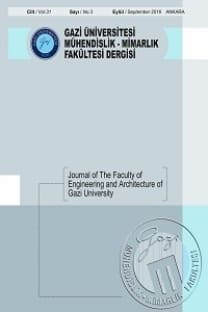Zamana-bağımlı öğrenme etkili çizelgeleme probleminde maksimum gecikme minimizasyonu: Doğrusal olmayan programlama modeli
Minimizing the maximum lateness in a scheduling problem with a time-dependent learning effect: A non-linear programming model
___
- 1. Biskup, D., “A state-of-the-art review on scheduling with learning effects”, European Journal of Operational Research, baskıda, 2007.
- 2. Biskup, D., “Single-machine scheduling with learning considerations”, European Journal of Operational Research, Cilt 115, 173-178, 1999.
- 3. Mosheiov, G., “Scheduling problems with a learning effect”, European Journal of Operational Research, Cilt 132, 687-693, 2001
- 4. Moore, J.M., “An n job, one machine sequencing algorithm for minimizing the number of tardy jobs”, Management Science, Cilt 15, 102–109, 1968.
- 5. Zhao, C.-L., Q.-L. Zhang and H.-Y. Tang, "Machine scheduling problems with learning effects”, Dynamics of Continuous, Discrete and Impulsive Systems, Series A: Mathematical Analysis, Cilt 11, 741-750, 2004.
- 6. Wu, C.-C., Lee, W.-C., Chen, T., “Heuristic algorithms for solving the maximum lateness scheduling problem with learning considerations”, Computers & Industrial Engineering, Cilt 52, 124-132, 2007.
- 7. Eren, T., Güner, E., “Minimizing total tardiness in a scheduling problem with a learning effect”, Applied Mathematical Modelling, Cilt 31, 1351- 1361, 2007.
- 8. Kuo, W.-H., Yang, D.-L., “Minimizing the total completion time in a singlemachine scheduling problem with a time-dependent learning effect”, European Journal of Operational Research, Cilt 174, 1184-1190, 2006.
- 9. Kuo, W.-H., Yang, D.-L., “Minimizing the makespan in a single machine scheduling problem with a time-based learning effect”, Information Processing Letters, Cilt 97, 64–67, 2006.
- 10. Kuo, W.-H., Yang, D.-L., “Single-machine group scheduling with a timedependent learning effect”, Computers and Operations Research, Cilt 33, 2099-2112, 2006.
- ISSN: 1300-1884
- Yayın Aralığı: 4
- Başlangıç: 1986
- Yayıncı: Oğuzhan YILMAZ
Ahmet Necati ÖZSEZEN, Mustafa ÇANAKÇI
DENEYSEL TUZ GRADİYENTLİ PROTOTİP BİR GÜNEŞ HAVUZUNUN ISIL PERFORMANSI
Nalan Ç. BEZİR, Arzu ŞENCAN, Nuri ÖZEK, Ali YAKUT, Refik KAYALI, Erkan DİKMEN
BÜTÜNLEŞİK VERİ KÜPÜ SİSTEMİ (BVKS): SATIŞ KÜPÜ UYGULAMASI
Tahsin ÇETİNYOKUŞ, Hadi GÖKÇEN
Ahmet ÖZSEZEN, Mustafa ÇANAKÇI
Kablosuz algılayıcı ağlarında homomorfik şifreleme ile güvenli veri kümeleme
Kula tarihsel kentinin yirminci yüzyıldaki fiziksel dönüşümünün mekan dizim analiziyle incelenmesi
AYRIK VE BİRLEŞİK ISI BORULU KOLLEKTÖR VERİMLERİNİN DENEYSEL OLARAK İNCELENMESİ
Bahadır ACAR, Etem ÖZ, Engin GEDİK
Kullanıcı merkezli tasarım ve ürün kullanılabilirliği üzerine bir literatür araştırması
